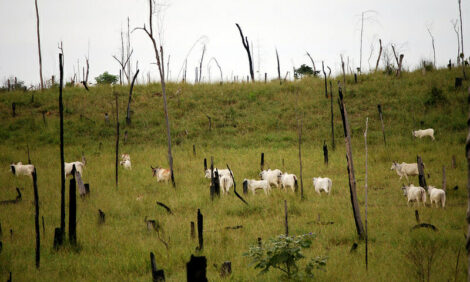



EU Commission Urged to be Prudent over TTIP Impact on Beef
EU - EU farmers' organisation Copa & Cogeca urged the EU Commission this week to exercise caution in the free trade talks between the EU and US (TTIP) after a new study revealed that a potential trade deal could have a severe impact on the EU beef sector.The issue was debated in Copa & Cogeca beef working party. Speaking after the meeting, Jean-Pierre Fleury warned: “Prices are continuing to drop in the EU beef sector, and the Russian ban on EU agriculture exports is still in place.
"The dairy sector has been particularly badly affected which is having knock-on effects on the beef sector.
"Beef production was up 3.6 per cent in 2015 due to the continued pressure on the dairy sector, as producers are switching from dairy to beef production, which is resulting in extra supplies on the market. Prospects are not positive either, with beef producers fearing further downward pressure on prices in the short-term.
“In view of the difficulties, it is crucial to find new markets for our produce. We also need additional tools to give exporters some security and help protect them against risk when exporting to new markets.
"The only possible tool here is export credit guarantees and we urge the EU to step up action to use these tools,” he said.
“We also urge the EU Commission to be extremely prudent in the free trade talks between the EU and US (TTIP) after a new study, carried out by the French Livestock Institute on the competitiveness of the EU suckler cow sector in the framework of the TTIP talks, confirms that the classification of beef as a sensitive product in these negotiations is justified,” Mr Fleury stressed.
In the market access offers exchanged in October 97 per cent of tariff lines were included in the other and 3 per cent in other treatment category which includes beef, poultry and pork.
He continued: “On high value cuts such as loin cuts, the US beef sector remains more competitive due to economies of scale (feedlots), different environmental practices & manure management, different animal welfare and health standards, lack of a mandatory traceability system.
"The EU has very high standards in this respect which imports to the EU do not have to meet. Loin cuts nevertheless represent the main source of income for our beef producers.
"Without a cautious approach in TTIP, this type of production could be badly hit, with a negative impact on the economies of rural regions.
"In my native country France, for example, which has the highest number of suckler cows in the EU, the same study confirms a potential drop in incomes of specialised French beef producers of up to 40-50 per cent which would be very damaging especially as they farm in areas where no alternative form of employment exists.”
Wrapping up, he called on the Commission to take a prudent approach in these negotiations. The talks are currently in their 13th round, which took place in New York last week.
TheCattleSite News Desk


